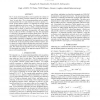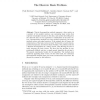1258 search results - page 6 / 252 » Architecture-driven Problem Decomposition |
94
Voted
CCE
2006
15 years 2 months ago
2006
Lagrangean decomposition has been recognized as a promising approach for solving large-scale optimization problems. However, Lagrangean decomposition is critically dependent on th...
120
click to vote
ICASSP
2011
IEEE
14 years 6 months ago
2011
IEEE
The K-means clustering problem seeks to partition the columns of a data matrix in subsets, such that columns in the same subset are ‘close’ to each other. The co-clustering pr...
144
click to vote
CORR
2011
Springer
14 years 8 months ago
2011
Springer
We analyze a class of estimators based on a convex relaxation for solving highdimensional matrix decomposition problems. The observations are the noisy realizations of the sum of ...
117
click to vote
TKDE
2008
15 years 2 months ago
2008
Matrix decomposition methods represent a data matrix as a product of two smaller matrices: one containing basis vectors that represent meaningful concepts in the data, and another ...
133
click to vote
TSP
2011
14 years 9 months ago
2011
Abstract—We propose a sequential framework for the distributed multiple-sensor estimation and coding problem that decomposes the problem into a series of side-informed source cod...


